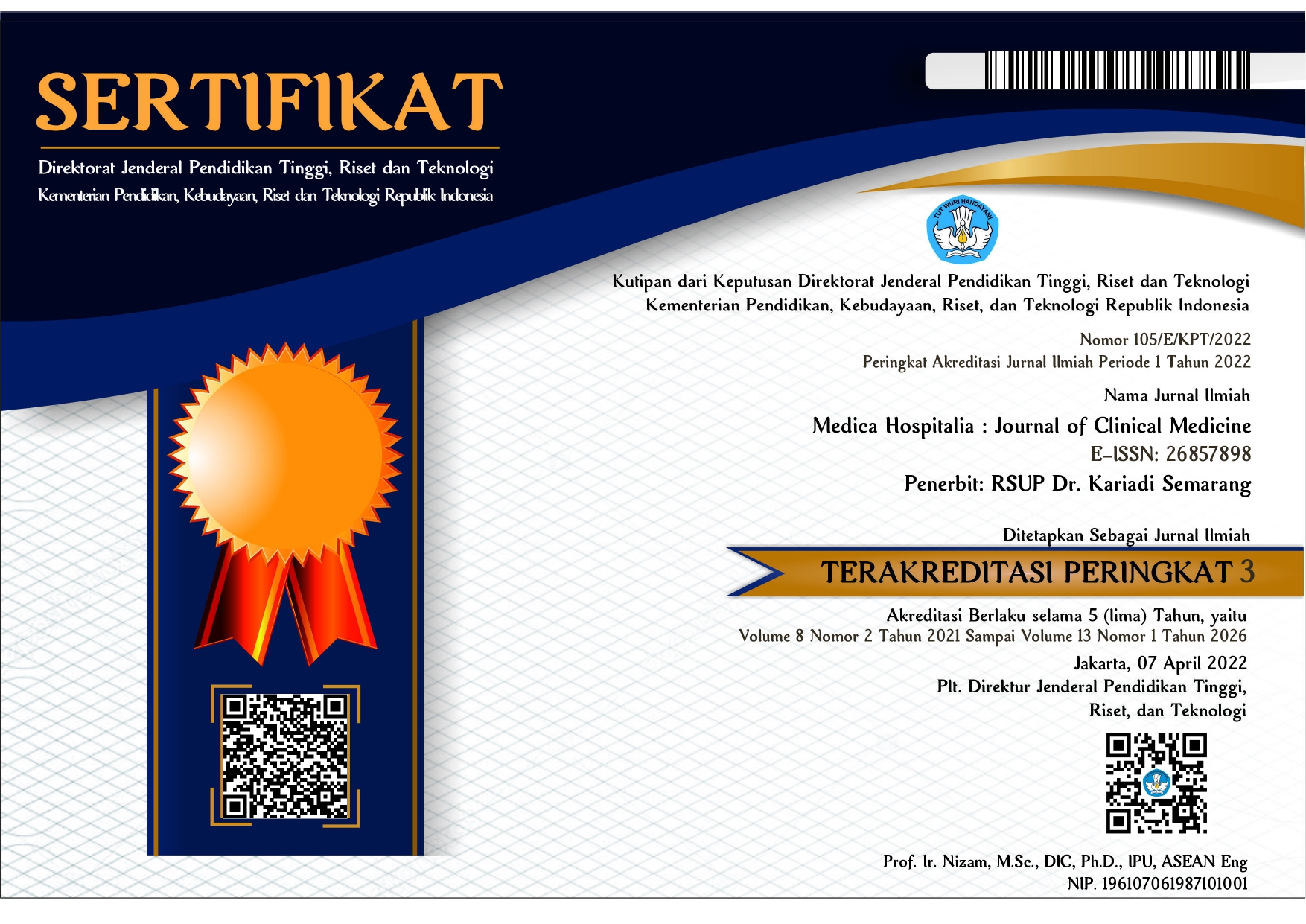Kondisi Psikologis Perawat yang Memberikan Asuhan Keperawatan Pada Pasien COVID-19: Tinjauan Narasi
DOI:
https://doi.org/10.36408/mhjcm.v7i1A.461Keywords:
Asuhan keperawatan, COVID-19, Efek psikologi, PerawatAbstract
LATAR BELAKANG: Coronavirus disease-19 (COVID-19) menjadi wabah dunia yang menimbulkan beban psikologis bagi masyarakat dan tenaga kesehatan yang memberikan perawatan pada pasien dengan COVID -19. Perawat merupakan salah satu tenaga kesehatan yang menjadi garda terdepan pemberian asuhan keperawatan pada pasien.
TUJUAN: Mendeskripsikan kondisi psikologis perawat yang memberikan asuhan keperawatan pada pasien dengan COVID-19.
METODE: Penelitian ini merupakan narrative review. Sebelas artikel dipilih dari Google Scholar, PubMed, EBSCO, dan ProQuest yang telah di-peer-reviewed dan dipublikasikan, full-text, serta dalam bahasa Inggris mulai dari tanggal 1 Januari 2020 sampai 31 Mei 2020. Istilah pencarian yang digunakan dalam pencarian artikel yakni COVID-19, nursing care, nurse, dan psychological effect.
HASIL: Sebelas artikel yang telah ditinjau menyebutkan bahwa kondisi psikologis perawat yang memberikan asuhan keperawatan pada pasien COVID-19 meliputi kecemasan, rasa takut, depresi, kelelahan, sulit tidur atau insomnia, gangguan mental lain, somatisasi, mudah marah, obsesif-konvulsif, penurunan nafsu makan, merasa tidak nyaman, tidak berdaya, menangis, dan bahkan terlintas untuk bunuh diri.
SIMPULAN: Memberikan perawatan kepada pasien dengan COVID-19 dapat menimbulkan gangguan psikologi pada perawat.
Kata Kunci: Asuhan keperawatan, COVID-19, Efek psikologi, Perawat
Psychological Condition of Nurses who Provided Nursing Care in Patient with COVID-19: A Narrative review
ABSTRACT
BACKGROUND : Coronavirus disease-19 (COVID-19) became epidemic and caused psychological disorder for the community and health workers who provided care for patients with COVID-19. Nurses are one of the frontline workers who provide nursing care to the patients.
OBJECTIVE: To describe psychological condition of nurses who provided nursing care for patients with COVID-19.
METHOD : This article was a narrative review. Eleven articles were selected from Google Scholar, PubMed, EBSCO, and ProQuest which have been peer-reviewed and published, full text in English, started from 1st January 2020 to 31th May 2020. The search terms were COVID-19, nursing care, nurse, and psychological effects.
RESULT : The eleven reviewed articles showed that psychological condition of nurses who provided nursing care in patients with VOVID-19 included anxiety, fear, depression, fatigue, insomnia, other mental disorders, somatization, irritable, obsessive-convulsive, loss of appetite, uncomfortable feeling, helplessness, crying, and even suicidal thought.
CONCLUSION : Providing care in patients with COVID-19 may cause psychological disturbances for nurses.
Keywords: Nursing care, COVID-19, psychological effect, nurse
Downloads
References
2. World Health Organization. Mental Health and Psychosocial Considerations During COVID-19 Outbreak. World Heal Organ. 2020;(January):1–6.
3. Nanshan Chen, Min Zhou, Xuan Dong, Jieming Qu, Fengyun Gong, Yang Han, Yang Qiu, Jingli Wang, Ying Liu, Yuan Wei, Jia’an Xia, Ting Yu, Xinxin Zhang LZ. Epidemiological and clinical characteristics of 99 cases of 2019 novel coronavirus pneumonia in Wuhan, China: a descriptive study. 2020;(January):19–21.
4. Chang T, Wu J, Chang L. Clinical features of patients infected with 2019 novel coronavirus in Wuhan, China. J Formos Med Assoc. 2020;(January).
5. Clark A, Jit M, Warren-gash C, Guthrie B, Wang HHX, Mercer SW, et al. Global, regional, and national estimates of the population at increased risk of severe COVID-19 due to underlying health conditions in 2020: a modelling study. Lancet Glob Heal. 2020;(20):1–15.
6. Gao Z, Xu Y, Sun C, Wang X, Guo Y, Qiu S, et al. A systematic review of asymptomatic infections with COVID-19. J Microbiol Immunol Infect [Internet]. 2020;(xxxx):1–5. Available from: https://doi.org/10.1016/j.jmii.2020.05.001
7. Yuen KS, Ye ZW, Fung SY, Chan CP, Jin DY. SARS-CoV-2 and COVID-19: The most important research questions. Cell Biosci [Internet]. 2020;10(1):1–5. Available from: https://doi.org/10.1186/s13578-020-00404-4
8. Culp WC. Coronavirus Disease 2019. A A Pract. 2020;14(6):e01218.
9. Kementrian Kesehatan Republik Indonesia. Situasi Terkini Perkembangan (COVID-19). 05 Mei [Internet]. 2020; Available from: https://covid19.kemkes.go.id/download/Situasi_Terkini_050520.pdf
10. Wu YC, Chen CS, Chan YJ. The outbreak of COVID-19 -An overview. J Chin Med Assoc. 2020;217–20.
11. Huang L, Lin G, Tang L, Zhou LY and Z. Special attention to nurses’ protection during the COVID-19 epidemic. Med Sci Sport Exerc [Internet]. 2017;49(5S):354. Available from: https://www.ncbi.nlm.nih.gov/pmc/articles/PMC7101882/pdf/13054_2020_Article_2841.pdf
12. Niiyama E, Okamura H, Kohama A, Taniguchi T, Sounohara M, Nagao M. A survey of nurses who experienced trauma in the workplace: Influence of coping strategies on traumatic stress. Stress Heal. 2009;25(1):3–9.
13. Hu D, Kong Y, Li W, Han Q, Zhang X, Zhu LX, et al. Frontline Nurses’ Burnout, Anxiety, Depression, and Fear Statuses and Their Associated Factors During the COVID-19 Outbreak in Wuhan, China: A Big-Scale Cross-Sectional Study. SSRN Electron J. 2020;000.
14. WHO. On the front line of COVID-19: inspiring stories of health care workers 1 / 13. :1–13.
15. Mo Y, Deng L, Zhang L, Lang Q, Liao C, Wang N, et al. Work stress among Chinese nurses to support Wuhan in fighting against COVID-19 epidemic. J Nurs Manag. 2020;(March):1–8.
16. Sun N, Wei L, Shi S, Jiao D, Song R, Ma L, et al. A qualitative study on the psychological experience of caregivers of COVID-19 patients. Am J Infect Control [Internet]. 2020;48(6):592–8. Available from: https://doi.org/10.1016/j.ajic.2020.03.018
17. Wu Y, Wang J, Luo C, Hu S, Lin X, Anderson AE, et al. A Comparison of Burnout Frequency Among Oncology Physicians and Nurses Working on the Frontline and Usual Wards During the COVID-19 Epidemic in Wuhan, China. J Pain Symptom Manage [Internet]. 2020; Available from: https://doi.org/10.1016/j.jpainsymman.2020.04.008
18. Zhang Y, Wei L, Li H, Pan Y, Wang J, Li Q, et al. The Psychological Change Process of Frontline Nurses Caring for Patients with COVID-19 during Its Outbreak. Issues Ment Health Nurs [Internet]. 2020;0(0):1–6. Available from: https://doi.org/10.1080/01612840.2020.1752865
19. Shen X, Zou X, Zhong X, Yan J, Li L. Psychological stress of ICU nurses in the time of COVID-19. Crit Care. 2020;24(1):2–4.
20. Lu W, Wang H, Lin Y, Li L. Psychological status of medical workforce during the COVID-19 pandemic: A cross-sectional study. Psychiatry Res. 2020;288(April):1–5.
21. Zhang X, Jiang Z, Yuan X, Wang Y, Huang D, Hu R, et al. Nurses reports of actual work hours and preferred work hours per shift among frontline nurses during coronavirus disease 2019 (COVID-19) epidemic: A cross-sectional survey. Int J Nurs Stud. 2020;2019(xxxx).
22. Zhang WR, Wang K, Yin L, Zhao WF, Xue Q, Peng M, et al. Mental Health and Psychosocial Problems of Medical Health Workers during the COVID-19 Epidemic in China. Psychother Psychosom. 2020;100053(45).
23. Kang L, Ma S, Chen M, Yang J, Wang Y, Li R, et al. Impact on mental health and perceptions of psychological care among medical and nursing staff in Wuhan during the 2019 novel coronavirus disease outbreak: A cross-sectional study. Brain Behav Immun. 2020;(March):1–7.
24. Lai J, Ma S, Wang Y, Cai Z, Hu J, Wei N, et al. Factors Associated With Mental Health Outcomes Among Health Care Workers Exposed to Coronavirus Disease 2019. JAMA Netw Open [Internet]. 2020 Mar 23;3(3):e203976–e203976. Available from: https://doi.org/10.1001/jamanetworkopen.2020.3976
25. Liu Q, Luo D, Haase JE, Guo Q, Wang XQ, Liu S, et al. The experiences of health-care providers during the COVID-19 crisis in China: a qualitative study. Lancet Glob Heal [Internet]. 2020;8(6):e790–8. Available from: http://dx.doi.org/10.1016/S2214-109X(20)30204-7
26. Tsaras K, Papathanasiou I V., Vus V, Panagiotopoulou A, Katsou MA, Kelesi M, et al. Predicting Factors of Depression and Anxiety in Mental Health Nurses: A Quantitative Cross-Sectional Study. Med Arch (Sarajevo, Bosnia Herzegovina). 2018;72(1):62–7.
27. Cheung T, Yip PSF. Depression, anxiety and symptoms of stress among Hong Kong nurses: A cross-sectional study. Int J Environ Res Public Health [Internet]. 2015 Sep 7 [cited 2020 Jul 16];12(9):11072–100. Available from: https://pubmed.ncbi.nlm.nih.gov/26371020/
28. Alilu L, Zamanzadeh V, Valizadeh L, Habibzadeh H, Gillespie M. A grounded theory study of the intention of nurses to leave the profession. Rev Lat Am Enfermagem [Internet]. 2017 [cited 2020 Jul 16];25. Available from: https://pubmed.ncbi.nlm.nih.gov/28591301/
29. Su TP, Lien TC, Yang CY, Su YL, Wang JH, Tsai SL, et al. Prevalence of psychiatric morbidity and psychological adaptation of the nurses in a structured SARS caring unit during outbreak: A prospective and periodic assessment study in Taiwan. J Psychiatr Res [Internet]. 2007 [cited 2020 Jul 16];41(1–2):119–30. Available from: https://pubmed.ncbi.nlm.nih.gov/16460760/
30. WHO. Transmission of SARS-CoV-2?: implications for infection prevention precautions. 2020;(March):1–10.
Additional Files
Published
How to Cite
Issue
Section
Citation Check
License
Copyright (c) 2020 Medica Hospitalia : Journal of Clinical Medicine

This work is licensed under a Creative Commons Attribution-ShareAlike 4.0 International License.
Copyrights Notice
Copyrights:
Researchers publishing manuscrips at Medica Hospitalis: Journal of Clinical Medicine agree with regulations as follow:
Copyrights of each article belong to researchers, and it is likewise the patent rights
Researchers admit that Medica Hospitalia: Journal of Clinical Medicine has the right of first publication
Researchers may submit manuscripts separately, manage non exclusive distribution of published manuscripts into other versions (such as: being sent to researchers’ institutional repository, publication in the books, etc), admitting that manuscripts have been firstly published at Medica Hospitalia: Journal of Clinical Medicine
License:
Medica Hospitalia: Journal of Clinical Medicine is disseminated based on provisions of Creative Common Attribution-Share Alike 4.0 Internasional It allows individuals to duplicate and disseminate manuscripts in any formats, to alter, compose and make derivatives of manuscripts for any purpose. You are not allowed to use manuscripts for commercial purposes. You should properly acknowledge, reference links, and state that alterations have been made. You can do so in proper ways, but it does not hint that the licensors support you or your usage.

























